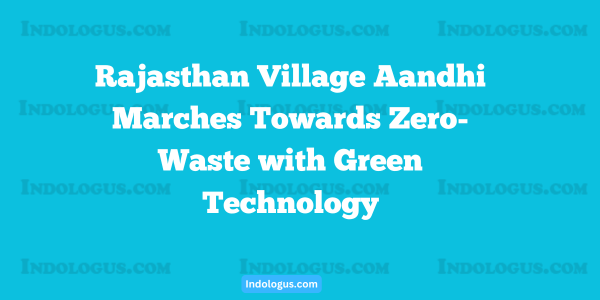Introduction: Aandhi’s Transformation Journey: In Aandhi, a small village located about 43 km from Jaipur, Rajasthan, a remarkable transformation is underway. With the help of innovative green technology interventions, Aandhi is striving to become a zero-waste model. This initiative not only aims to manage waste effectively but also to promote sustainability and resource recovery.
Green Technology Interventions
The zero-waste initiative in Aandhi encompasses a comprehensive package of technology solutions designed to convert various types of waste—such as food scraps, agricultural residues, wastewater, and even hospital waste—into valuable resources. Key components of this initiative include:
1. Organic Waste Bio-Methanation Plant
At the local government school, an Organic Waste Bio-Methanation Plant with a capacity of 100 kg has been installed. This facility converts organic waste into biogas through anaerobic digestion. It features a 5 KW solar energy system, providing clean energy for cooking and electricity generation. This not only reduces reliance on traditional fuels but also promotes cleaner air and lower greenhouse gas emissions.
2. Vermifiltration Technology
Implemented at the Community Health Centre, this technology uses earthworms to filter and treat wastewater. With a capacity of 10 KLD, the Vermifiltration system purifies greywater and sewage, making it suitable for agricultural irrigation and landscape watering. The integration of solar energy ensures an eco-friendly approach to wastewater management, contributing to sustainable water reuse.
3. Constructed Wetlands
A constructed wetland system has been established at the village’s main pond, with a capacity of 20 KLD. This system mimics natural wetland processes to treat wastewater and enhance biodiversity. It helps manage village wastewater while supporting local flora and fauna, ultimately improving the health of the pond ecosystem.
Community Engagement and Resource Recovery
Partnerships with recycling agencies have been established to facilitate the collection and segregation of recyclable waste at the Resource Recovery Center (RRC). Additionally, vermicomposting units have been set up, and villagers have been educated on effective waste management techniques.
Commitment to Sustainability
These initiatives reflect the transformative potential of green technology in rural communities, highlighting the Department of Science and Technology’s (DST) commitment to innovation and environmental stewardship. The project aligns with India’s broader goals of environmental sustainability, climate change mitigation, and waste-to-wealth models that uplift local communities.
Replication Potential
By leveraging these advanced green technologies, the project aims to create a self-sustaining zero-waste management model that can be replicated across rural areas in India. This initiative paves the way for a cleaner, greener, and more sustainable future, contributing to the vision of an inclusive and sustainable net-zero nation.
Conclusion: A Pathway to Sustainable Development
Aandhi’s journey towards becoming a zero-waste village showcases the power of community-driven initiatives supported by green technology. As this model proves effective, it could serve as a blueprint for other villages in India, marking a significant step towards sustainable rural development and environmental conservation.



